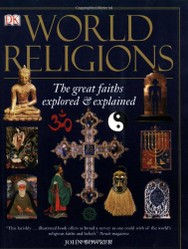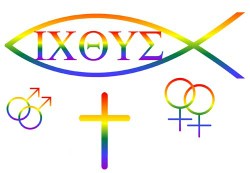This article was inspired by brl's article How to become a minister online and is not meant to criticize it in any way, but rather to add my own thoughts to the whole subject. Her article is well researched and well written, but there are some points to the whole topic of 'online ordination' I want to mention.

Ordained Online – Scam, Mockery or Outright Dangerous?
by Sam
Getting ordained online seems to be the latest craze on the internet. Some people think of it as a scam, whilst others believe it to be the best thing to have appeared on the net.
A bit of light reading ;-)
 |
| World Religions: The Great Faiths Explored & Explained Only $30.89 |
 |
| Experiencing the World's Religions |
What is Online Ordination?
In a nutshell, these are websites where you submit your name and address and in return they send you a certificate (either by email, so that you can print it yourself or by snail mail, already printed) that you are now an ordained minister of their organization. Some of these websites offer this for free (print yourself certificate), others ask for a moderate, or not so moderate, fee for the printed certificate. And virtually all of them offer additional products from business cards, wedding certificates, luxury all-in-one start your own church kits to liturgical vestments. In the end these companies are in this market to make money therefor they need to sell something. The free online ordination is just a bait to get more people to buy their products – no more.
Why Do I think Online Ordinations to be Outright Dangerous?
This is perhaps the biggest problem with people getting ordained online - There is no screening of the candidates whatsoever. Whilst a lot of people will now say 'Exactly, that is the beauty of it, no discrimination of anybody!' please consider also the following:
No screening means exactly this - The candidates don't need to provide any background check regarding criminal records and personal conduct. See the problem? Whilst for many it is just something they do 'for fun' or to be able to marry their friends, there is a big loop hole in the whole system for people with less noble intentions. Really everybody can get ordained by this online organizations, even a convicted pedophile!
Whilst the screening done by Churches and other Faiths could be, in many cases, still be improved, doing no screening at all of possible candidates is like an open invitation to potential abusers.
Similar to the point above, there is also no supervision or oversight of the candidates when they enter their ministry. And no, I don't mean here the supervision and oversight regarding if the minister preaches and teaches the 'right doctrine', I mean there is no religious authority that keeps an eye on the personal conduct and behavior of their 'ministers' nor anybody a concerned person could contact if they have the feeling something is wrong with the behavior of one of these 'ministers'. The only way to do so would be to contact the civil authorities directly, but sadly they will often not investigate on suspicion alone.
Is Online Ordination a Mockery of Faith?
The following quote is taken from one of the websites that offer free online ordinations:
“You may become a legally ordained minister for life, without cost,
and without question of faith.”
So even if you don't have any faith at all, you can become a minister in this self-proclaimed 'church'! This shows, in my opinion, nicely that the real intention behind this kind of online services is not to help people in their respective spiritual journeys, but simply to make a business out of it.
Is Getting Ordained Online a Threat to Religious Freedom?
Many will argue, that it is actually the opposite of that – The ultimate expression of religious freedom, but if you look a bit closer that might be not the case at all.
Religious freedom, which includes the freedom of NOT believing in any religion, is a basic human right and many people have fought and died for this right. By devaluing it to such an extent that it takes only an email address, and perhaps a few dollars, to become a religious minister, this could actually badly backfire. Let me explain ...
One of the major companies that offer these kind of services claims to have ordained already over 20 million people worldwide. Sooner or later legal authorities will question this sudden increase in 'ministers' and will try to actually determine which group is a real Church or Faith and which not. And this will affect smaller, but authentic, Churches and Faiths also – most likely negatively. In the wake of that, smaller Churches and Faiths might lose the right to legally marry people or to be exempt from certain forms of taxes for the charitable work they are doing.
To put it blandly, by making religion and spirituality so cheap that virtually everybody can become an 'online ordained minister,' the value of religious conviction and the rights of religious freedom for everybody will decrease.
I think it was Voltaire that said
“I don't believe what you believe, but I will risk my life to defend your right to believe it!”
Personal belief is incredibly valuable for a lot of people, seeing it degraded to this low level is disturbing for many. Voltaire was not a Christian btw, far from it, but he acknowledged that defending the right of any person to express their beliefs freely is important. And so do a lot of other people today.
Is Online Ordination a Scam?
The definition of 'scam' according to the Merriam-Webster dictionary is 'a fraudulent or deceptive act or operation'. As for 'getting ordained online' this can be applied in two ways:
The business that operates the 'online ordinations' is a scam, making promises and claims that it can't fulfill.
I looked at a lot of these websites and one point was always stressed, 'You can marry people after been ordained by us!'
Now the wedding industry is one of the biggest industries in nearly every country and a lot of people want to have a 'slice of this wedding cake'. These companies offer 'ordination' no matter where you live. But the problem is that in many parts of the world this 'ordination' is not recognized, nor does it give the ordained person the right to marry people legally. There is also little information about the legalities of this on these websites, they simple tell people to contact their registrar offices to inquire about the actual procedures after they have been ordained.
The online ordained person becomes a scam him- or herself, pretending to be something they are not and so scamming others.
A lot of these ordinands want to get ordained in order to marry people, either people they do know or people they don't know. And yes, some of these 'online ministers' do see it as a fast and easy way to start a profitable business. The problem here is that these people have received no pastoral training whatsoever nor are they obliged to continue any training after their so-called 'ordination'. Something that is standard for ordinands and recently ordained ministers of pretty much any Church or Faith.
These 'online ordained ministers' can, theoretically, start their own Church congregation and would be soon confronted with situations they have never contemplated before, such as parents losing a child, domestic violence or even 'simple' spiritual questions. How will they be prepared to help these people that experience a pastoral need, if they haven't received any training in these matters?
Whilst in theory everybody can found a new Church, the back-up and apparent legitimacy these online companies give their new 'ministers' can fool a lot of people into believing that they are a real Church with carefully selected and trained ministers. Which they are clearly not, in my opinion.
An Alternative to Getting Ordained Online
If you really just want to marry your friends, you can do so in a private ceremony, no need to get ordained for this. The only drawback is that the happy couple will still need to have a legal, civil ceremony in order to be legally married. But so what? If your spiritual attitude is so important to them, they will be happy with your ceremony as it is. If the legal bits are more important than the spiritual aspects, I really would ask them why they want to get married by you in the first place!
In some parts of the US, like for example in California, you can even apply to become a 'Deputy Commissioner of Marriages' for one day, allowing you so to legally marry your friends or family member on that day. See this >Wikipedia Article< and considered to ask at the respective registrar office if this option exists in the county the happy couple wishes to marry.
Summary
- Getting ordained online seems a fun way to be able, for example, to legally marry your best friends, at least in some countries. On the other hand, it opens the door to scams and abuse of the ones that believe these online ordained ministers to be real people of faith which, unfortunately, they sometimes not are.
- By getting ordained online with one of these companies, you support them and make it possible for them to continue to ordain people that never should have been ordained in the first place because of their sexual misconduct towards children, for example.
- There are several other possibilities for you to marry a couple legally, or at least privately, without the need of you getting ordained online (see paragraph above).
- And no, I don't believe that these kind of 'service' is a threat to a more traditional approach to Faith, far from it. But I do believe that it is a threat for the people that fall for this kind of ministers, both financially as well as spiritually.
You might also like
Gay Churches - How to find an inclusive ChurchGoing on vacations, moving or just want to explore a new Church? Finding a Ch...
Leviticus 18:22 - What does the Bible say about homosexuality?The one Bible verse that is bound to turn up when discussing homosexuality wi...



 How to Choose the Topic for your First Bookon 12/17/2012
How to Choose the Topic for your First Bookon 12/17/2012
 Why I published my first book on Amazon - and you should too ;-)on 11/30/2012
Why I published my first book on Amazon - and you should too ;-)on 11/30/2012
 What to do with Kids in Prague - Go To the ZOOon 10/30/2012
What to do with Kids in Prague - Go To the ZOOon 10/30/2012
 Choco Story Museum - Things to do with Kids in Pragueon 10/30/2012
Choco Story Museum - Things to do with Kids in Pragueon 10/30/2012



Comments
This is a really interesting topic, and I'm not 100% sure what my stance is on it. I'm someone who has co-founded a group, Why This Way, which is in the gray area of whether or not it would be considered a religion (I personally think that it would be, according to tax law, in the same way ethical humanism would). I am not really sure I'd consider these groups to be a threat to my rights though...if I see one of them challenged on the basis of being a religion for tax purposes, I don't think this would affect me or the group I'm involved in, because these groups don't really have any beliefs.
For example, Why This Way doesn't have any ministers or ordination process, but we do have a system of beliefs and practices that encompass all aspects of life, and while we do not require anyone to believe the beliefs or practice the practices (in part because we don't identify members) we definitely work to encourage and promote the beliefs and practices that we've agreed upon.
I do see one legitimate use of these online ordination things--which is as a form of civil disobedience, for people who are not involved in organized religion but who want to be able to perform marriage ceremonies legally, without using a government official. I'm someone who would prefer the government to be less involved in marriage than it currently is, but the current setup seems to discriminate against people who are involved in more decentralized religions because usually the government only allows ordained ministers to perform marriage rites, from my understanding. So I can understand why people would want to support this sort of thing as a form of protest.
sheilamarie, the length of academic study varies greatly between different countries and Churches. And yes, I was only referring to the actual length of the study time, not to the long discernment process that always proceeds ordination in a legitimate Church nor to the time spend with what is often called 'Post Ordination Training', in the Church of England also know as POTty training ;-)
As for the rest you wrote, I couldn't agree more!
Actually, there are some seminary courses a person can take online. This is a different thing as the person accepted into these courses must have connections with a parish and references from their own priest/minister. There always has to be a personal connection even when the course work is legitimate.
I assume, Sam, you mean 2 to 5 years after a 4 year university degree; at least that's the length of study I'm familiar with. I find this whole idea outrageous. I guess it's all part of the attempt many are engaged in of dismantling the legitimacy of religious belief and trust. I know the clergy have a lot to answer for over the events of these last few years, but this just seems a mockery. As humans, we are spiritual beings with real spiritual needs. Humanity is not served when we make a mockery of those who attend to these human needs.
Yes, a bit like 'become a surgeon online', would you let somebody with such a degree perform an operation on you? It also shows that a lot of people think that for being a minister you only need to get ordained, no knowledge necessary. The absolute minimum full time study I know off is 2 years, but more typical is 3 to 5 years and in most Churches that means an university study / degree.
What a bizarre concept! It seems to be a variation on "get your degree online, instantly - just send $1997.97 to .." scams. But I agree, because people do tend to trust "clergy" its potentially very dangerous